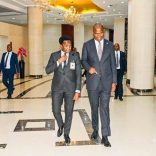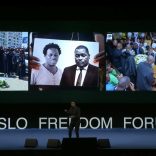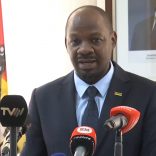Mozambique: Chapo and Mondlane hold second meeting - AIM report | Watch
Mozambique’s proposed constitutional changes: Peace “but not at any price,” say civil society bodies – AIM report

Some of Mozambique’s most respected civil society organisations have protested strongly against “aspects that severely damage citizenship rights” in the draft constitutional amendments that are currently before the country’s parliament, the Assembly of the Republic.
In a press release published on Thursday, the civil society bodies stress that they support the efforts made by President Filipe Nyusi and the leader of the Renamo rebels, Afonso Dhlakama, to reach a lasting peace, but they believe “it is at the very least problematic that the President and the Renamo leader, without the participation of Mozambicans, have agreed to change something which had never before been regarded as posing a problem for peace – namely the elimination of the direct election of mayors”.
The civil society release stresses that mayors have been elected directly in the country’s municipalities for the past two decades, and this has never been considered a problem. Voting for their mayors has become an “acquired right” of citizens living in municipalities.
The document could also see no reason for the withdrawal of the right to run independent candidates for mayor. As the proposal stands, no individual can put his or her name forward for mayor. The only election will be for the municipal assembly, and whichever party or other organisation wins the majority of votes in that election will appoint the mayor.
The civil society bodies warn “this is a crucial moment for our young democracy, and it is up to the Mozambican nation to commit itself to the defence and consolidation of democracy. Rights already won are not negotiable. Those are the rights that guarantee popular participation and involvement for the development of the country. Peace cannot be at any price”.
“There is no lasting peace without democracy and respect for freedoms already won”, the document warns.
The document urges the parliamentary deputies to send the constitutional amendments back to their proponent (President Nyusi) because they originated from an “undemocratic and non-participatory procedure”.
The deputies should also consider endowing the next parliament, due to be elected in 2019, with full powers to rewrite the Constitution. The main function of the new parliament would be “far-reaching constitutional amendment with broad popular participation”.
The press release was signed by 24 organisations, including the Christian Council of Mozambique (CCM) the National Union of Teachers (ONP), the Human Rights League (LDH), the Centre for Public Integrity (CIP), the Women’s Forum(Forum Mulher), Women, Law and Development (MULEIDE) and the Community Radios Forum (FORCOM).












Leave a Reply
Be the First to Comment!
You must be logged in to post a comment.
You must be logged in to post a comment.